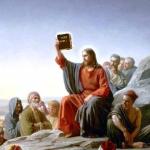This review is from Lawrence Garcia. Here’s his info:
Lawrence is the Senior Teaching-Pastor of Academia Church in Goodyear, Arizona. He is a pastor devoted to the educational growth of his congregants, and the raising up of a new generation of disciples, who will think, tell, and live out the Christian story. Lawrence is currently attending Liberty University.
—————————————————–
I recently read somewhere something along the lines that, “Christians are different than Jews with regards to reading Scripture, as the Jewish tradition understands it to be terribly difficult while Christians perceive it as a quite easygoing and self-evident enterprise.” This statement is equally applicable in regards to the person of whom Scripture points, Jesus. After all, we, both inside and outside the church, assume we know Jesus; what other questions need to be asked?—he came to die for our personal sins, he claimed in no uncertain terms that he was “God”, and he rose from the dead so that we could enjoy posthumous life in heaven. But what if:
Jesus—the Jesus we might discover if we really looked!—is larger, more disturbing, more urgent than we— the church!—had ever imagined… It is we the churches, who have been the real reductionists. We have reduced the kingdom of God to private piety, the victory of the cross to comfort for the conscience, and Easter itself to a happy, escapist ending after a sad, dark tale. (pg. 5)
A stinging indictment indeed. Especially, since we are usually the ones hurling the reductionist charge at our so-called “skeptic” rivals. Thus, Wright sets out to re-ask the seemingly simple questions, “Who exactly was he?… What did he think he was up to? What did he do and say, why he was killed, and did he rise from the dead? …[and] what might ‘following’ him entail? Questions that are on the surface simple enough, but upon closer examination aren’t so simple to answer due to the complexity of the strange world Jesus occupied, which also happens to be the very launch pad for Wright’s fresh examination of Jesus’ kingdom vocation. But, before we continue, Wright politely asks that both skeptics who immediately become suspicious of meta-narratives derived from ancient texts and their antagonist, the conservatives who immediately become uncomfortable with historical inquiry lest it lead to a resurgence of rational skepticism, to take a seat and go along for the ride, a ride that is going to drive us into the heart of the “perfect storm” where the cold front of the Roman Empire combined with “low –pressure system” of Israel’s national yearning for liberation are met head-on with the “hurricane” of Israel’s God in Christ.
It is only when we are at the center of this turbulent storm that our narrow vision of Jesus becomes startlingly clear: that Jesus’ own understanding of his mission was to combine in himself the end-time rule of God, though by a paradoxical route patterned as it were after the royal Psalms and Suffering Servant Songs of Isaiah, both in the face Rome’s already presumed “retrospective eschatology,” namely that beginning with Augustus and his successive rulers a new era of justice and peace had dawned, and Israel’s “prospective eschatology,” namely that through a great military overthrow yet to come, Israel would finally reach her ultimate destiny. It is precisely at this fragile moment in history that Jesus:
Took upon himself the role of a prophet, in other words, of a man sent to God to reaffirm God’s intention of overthrowing the might of pagan empire, but also to warn Israel that its present way of going about things was dangerously ill-conceived and leading to disaster. And with that, the sea is lashed into a frenzy; the wind makes the waves dance like wild things; and Jesus himself strides out into the middle of it all, into the very eye of the storm, announcing that the time is fulfilled, that God’s kingdom is at hand. (pg. 56)
Once this historical torrent is in place, Wright masterfully illustrates how Jesus determined to pattern his risky-yet-innovative kingdom mission which combined the inauguration of God’s reign through a now suffering-Davidic ruler within the framework of the Exodus narrative. I must say, I became absolutely engrossed in the picture of Jesus of Nazareth combing through Scripture, putting together all the elements within Israel’s traditions in a never before hatched plan to embody in himself God’s final rule vis-à-vis the Roman Empire, Israel’s fervent nationalism, the power of death, and yes, human sin. It is at this point we can began to answer, albeit in fresh way, the questions concerning Jesus we always assumed were a given, of course, you’ll have to read it for yourself to get all the details.
In conclusion, as a pastor dedicated to informing my own congregants concerning the important role of history, not only in understanding what it is we actually have contained in our Gospel[s], but in fully grasping our mission together as the post-Pentecost body of Christ, this book is a welcome addition. Cruel Empire, Israel’s checkered story, and a thirty-something year old Jew with the wildest vision ever conceived—it’s all wonderfully discovered here in this deeply profound book paradoxically entitled Simply Jesus, which manages to explain, as only Wright can do, how infamous characters of the past like Herod the Great and Simon Bar Giora fit in with how we are both to understand and enact God’s wise, just, and loving rule under the world’s true King Jesus.
















